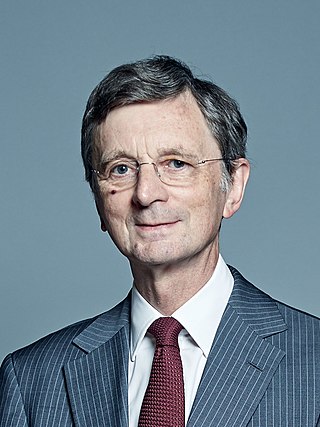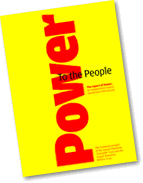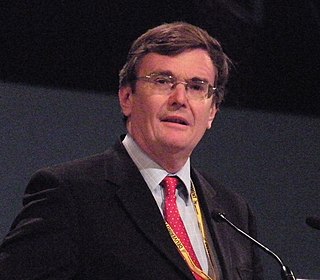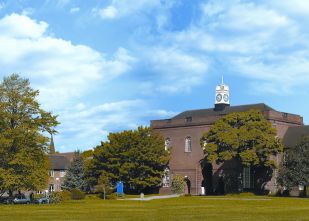Related Research Articles

The Parliament Acts 1911 and 1949 are two Acts of the Parliament of the United Kingdom, which form part of the constitution of the United Kingdom. Section 2(2) of the Parliament Act 1949 provides that the two Acts are to be construed as one.

In England, a City Technology College (CTC) is an urban all-ability specialist school for students aged 11 to 18 specialising in science, technology and mathematics. They charge no fees and are independent of local authority control, being overseen directly by the Department for Education. One fifth of the capital costs are met by private business sponsors, who also own or lease the buildings. The rest of the capital costs, and all running costs, are met by the Department.

Archibald Johnstone Kirkwood, Baron Kirkwood of Kirkhope,, is a British Liberal Democrat politician.
The Chief Whip is a political leader whose task is to enforce the whipping system, which aims to ensure that legislators who are members of a political party attend and vote on legislation as the party leadership prescribes.

NO2ID is a public campaign group, formed in 2004 to campaign against the United Kingdom government's plans to introduce UK ID Cards and the associated National Identity Register (NIR), which it believes has negative implications for privacy, civil liberties and personal safety. The NIR and ID cards were abolished by the Identity Documents Act 2010. Since then, it has been involved in other campaigns.

The POWER Inquiry was established in 2004 to explore how political participation and involvement can be increased and deepened in Britain. Its work is based on the primary belief that a healthy democracy requires the active participation of its citizens.
Short Money is the common name given to the annual payment to opposition parties in the United Kingdom House of Commons to help them with their costs. It includes funding to assist an opposition party in carrying out its Parliamentary business, for opposition parties' travel and associated expenses, and for the running costs of the Leader of the Opposition's office.
Cranborne Money is the common name given to the annual payment to opposition parties in the UK House of Lords to help them with their costs. It is named after Lord Cranborne, who was the leader of the House of Lords when it was introduced on 27 November 1996. Short Money is its counterpart in the House of Commons.
John Donkin Dormand, Baron Dormand of Easington was a British educationist and Labour Party politician from the coal mining area of Easington in County Durham, in the north-east of England. He was Member of Parliament (MP) for the Easington constituency from 1970 until his retirement in 1987.
A Consolidated Fund Act is an Act of the Parliament of the United Kingdom passed to allow, like an Appropriation Act, the Treasury to issue funds out of the Consolidated Fund.

Matthew Alan Oakeshott, Baron Oakeshott of Seagrove Bay, is a British investment manager and member of the House of Lords, formerly sitting in Parliament as a Liberal Democrat.
Chocolate Soldier is an expression referring to a good-looking but useless warrior, popularised by George Bernard Shaw's 1894 play Arms and the Man. The term originates as a derogatory label for a soldier who would not fight but would look good in a uniform, shortened from 'Chocolate Cream Soldier'.
"Do you agree, Mr. Clay," she asked, "or do you prefer the chocolate-cream soldiers, in red coats and gold lace?"
(from: Soldier of Fortune by Richard Harding Davis. 1897)

An Act of Parliament in the United Kingdom is primary legislation passed by the UK Parliament in Westminster, London.

The Channel Tunnel Rail Link Act 2008 is an Act of the Parliament of the United Kingdom which amends the Channel Tunnel Rail Link Act 1996. Its principal provision is to allow the Office of Rail Regulation to charge the operator of the Channel Tunnel Rail Link "a fee in respect of the exercise of any of the Office of Rail Regulation's functions in relation to the rail link".

A direct grant grammar school was a type of selective secondary school in the United Kingdom that existed between 1945 and 1976. One quarter of the places in these schools were directly funded by central government, while the remainder attracted fees, some paid by a Local Education Authority and some by the pupils' parents or guardians. On average, the schools received just over half of their income from the state.

Arnold Stephenson Rowntree was a Quaker and Liberal MP for York, England.

Take Back Parliament (TBP) was an organisation campaigning for democratic reform in the United Kingdom. The group was formed immediately before the 2010 general election, with funding from the Joseph Rowntree Reform Trust, hoping that there would be opportunities to push for electoral reform after the election. It took a leading role in the 2011 referendum on the Alternative Vote, pushing AV as better than the existing first past the post electoral system and potentially a step towards a proportional representation system. The group no longer exists.
Elijah Sandham was an English Independent Labour Party (ILP) politician from Lancashire. He sat in the House of Commons from 1929 to 1931 as the Member of Parliament (MP) for Kirkdale division of Liverpool, and in 1934 he led the breakaway Independent Socialist Party.
Parliamentary Debates (Hansard) is the official name of the transcripts of debates in the New Zealand Parliament. New Zealand was one of the first countries to establish an independent team of Hansard reporters, 42 years before the British (Imperial) Parliament. An official record of debates has been kept continuously since 9 July 1867. Speeches made in the House of Representatives and the Legislative Council between 1867 and the commencement of Parliament in 1854 were compiled in 1885 from earlier newspaper reports, and this compilation also forms part of the New Zealand Hansard record.
References
- ↑ Hansard, House of Commons Debates, 4 November 1993: Tony Newton and Margaret Beckett at Column 598 and Simon Hughes at Column 606 of Volume 231.
- ↑ Hansard, House of Lords Debates, 9 November 1977; see Lord Houghton of Sowerby at Column 204-205 of Volume 387.
- ↑ Short Money Archived 2010-04-23 at the Wayback Machine , Standard Note SN/PC/1663, 11 June 2009; see pages 6-7 and footnote 22.
- ↑ Hansard, House of Commons Debates, 4 November 1993: Margaret Beckett at Column 601 of Volume 231.
- ↑ Hansard, House of Lords Debates, 7 June 2000: Lord Oakeshott of Seagrove Bay at Column 1129 of Volume 613.
- ↑ The Joseph Rowntree Inheritance, 1904-2004 Archived 2011-05-18 at the Wayback Machine , p.11